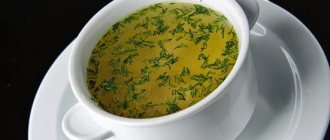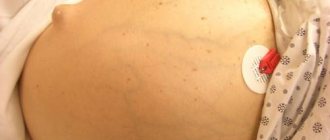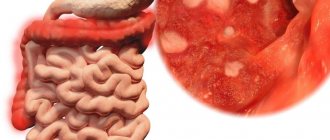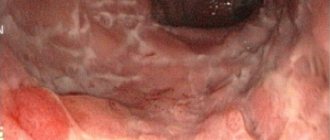Causes of ulcers
Ulcers in a child
Oral ulcers usually run in families.
Statistics show that mucosal lesions appear in young children with reduced immunity.
Ulcers appear for a variety of reasons, and here are the most common ones:
- Medicines. There are drugs that reduce salivation, and this contributes to the formation of ulcers on the mucous membrane.
- Vitamins. With a deficiency of certain vitamins (group B), folic acid and some important microelements (for example, iron), ulcerations appear on the palate in the body.
- Fungal infection or infection. Sometimes the immune system is so weakened that it does not recognize bacteria that have entered the body. The oral and nasal cavity is filled with a mass of foreign particles, and when pathogenic microbes appear, the balance between necessary and harmful bacteria is disrupted. In addition, ulcers cause the appearance of bacteria, leading to stomatitis.
- Allergic reaction. There are some food groups that can cause ulcers.
You need to monitor your diet and consume the following foods with caution:
- cereals (like buckwheat and rye)
- sweet and sour foods, including vegetables, fruits (especially citrus fruits)
- milk products
- some medications and dental equipment
- pastes, chewing gum with mint and mint itself
- chocolate products
- nuts, soy additives, vinegar
- mustard and all spicy products
Note. It is recommended to use pastes containing sodium lauryl sulfate.
Brushing your teeth with this substance regulates the water balance in the oral cavity, reducing the water content in it. After using this paste, your breath will become fresh, and the mucous membrane will become much more protected from bacteria that appear from the outside.
In addition, the reason may be:
- Dehydration. General dehydration of the body can cause ulcerations, regardless of the reasons for its manifestation.
- Hygiene. Often the problem lies in hygiene, or more precisely, in its thoroughness. This can usually be observed in children: eating unwashed vegetables and fruits, or dirty hands before lunch.
- Dental services. When installing, for example, a prosthesis, the doctor may have installed it carelessly, damaging the mucous membrane, or the prosthesis itself may have been of poor quality.
- Problems with the gastrointestinal tract. Diseases such as gastritis, ulcers, and colitis can cause ulcerations in the oral cavity, especially on the tongue. They can also be harbingers of these diseases.
- Stress. Tense situations unsettle a person, including his immunity. With emotional overload, the body's protective functions are weakened and infections enter the body.
- Hormones. The likelihood of ulcers in the mouth depends on hormonal imbalances in the body. This is usually influenced by such phenomena as the onset of the menstrual cycle and menopause.
- Heredity. If previous generations had a genetic predisposition to the appearance of mouth ulcers, then you will most likely also become a carrier of this hereditary factor.
- Injuries in the oral cavity. Damage to the mucous membrane from eating too hot food or a broken tooth can lead to infection in the wound, which contributes to the development of stomatitis.
- Negative habits. Excessive use of tobacco and alcoholic beverages damages the mucous membrane and can cause ulcers.
Sometimes ulcers form in very young children and the disease is called thrush. The baby's immune system cannot contain germs because it is too weak.
Thrush in a baby
The causative agent of the disease is located in the oral cavity or in the intestines, so medical attention is necessary here.
Also, ulcers are sometimes symptoms of systemic diseases, such as smallpox, diphtheria, food allergies.
If the disease does not appear for the first time, the doctor prescribes drugs that activate the immune system.
It is very important to understand the causes of ulcers, since treatment will depend on this. Traditional methods help well with this, but you need to consult a doctor, since ignorance can only make things worse.
Causes
There may be several reasons for the occurrence of such ulcers. The most harmless is mechanical injury to the soft tissues of the oral cavity or the mucous membrane of the tongue with solid food. For example, when chewing hard crackers or carrots, a person bit his tongue. But quite often the cause of the formation of ulcers on the oral mucosa is a serious local or system-wide disease. In order to choose the right treatment, it is necessary to establish an accurate diagnosis of the pathology.
The most common cause of inflammation of the oral mucosa is stomatitis. It is divided into traumatic, allergic, fungal, herpetiform and aphthous. Pathology can occur in both acute and chronic forms.
In the presence of aphthous stomatitis, specific aphthae are formed - ulcers with uneven edges, which are covered with a yellowish or white coating, the adjacent areas of the mucosa are hyperemic. Similar aphthae can develop on the mucous membranes of the cheeks, palate, tongue and in some cases on the lips. The sores are extremely painful and are hypersensitive to pepper or salt, as well as to hot and cold foods. Such an ulcer takes about 5-7 days to heal without complications.
You can prevent the development of complications and speed up healing with the help of preparations with propolis, carrot juice, honey, and rinsing your mouth with chamomile decoction.
In the presence of herpetiform stomatitis, a large number of ulcers develop in the mouth, which in appearance resemble herpes simplex. This pathology usually develops in women under thirty years of age. The ulcers are localized in the lower part of the tongue and have a grayish tint; they begin to hurt even with minimal movement of the tongue. Therapy is usually complex: local treatment - rinsing the mouth with a soda solution, a decoction of oak or chamomile bark, lubrication with sea buckthorn oil, general - antiviral agents that are designed to fight herpes.
With fungal stomatitis, ulcers in the mouth are covered with a white coating and are caused by the penetration of a fungal infection into the oral cavity. In such cases, antifungal drugs (Fluconazole, Ketoconazole), rinsing the mouth with chamomile decoction, gum gels, and liquid extract “Stomatofit A” are used.
Children may develop Bednar's aphthae - ulcers that are traumatic in nature. They arise from mechanical impact on the mucous membrane of the palate and are distinguished by a yellowish coating, which is caused by weak immunity and poor oral hygiene. Such wounds do not require treatment and go away on their own.
It is also possible to develop mouth ulcers if you have syphilis. They do not hurt or bleed, often they are not even noticeable and disappear over time, but when a patient is diagnosed with secondary syphilis, such manifestations should be reported to the doctor.
Treatment
First of all, careful oral hygiene is required: brush your teeth twice a day, rinse your mouth with a soda solution after meals, change your toothbrush at least once every three months. Toothpastes should be selected only from a trusted manufacturer.
Do not irritate formations on the mucous membrane with sour, salty, spicy and hard foods. Wounds will heal better and faster when food is consumed pureed. You should not eat foods with pronounced allergenic properties, even if you are not allergic to them: currants, nuts, raspberries, grapes, citrus fruits. You should not drink carbonated drinks. Before eating, you should rinse your mouth with cold water, which will dull the pain a little. It is better to eat cold food, since hot food brings a number of unpleasant sensations.
Today, the range of medications for the treatment of ulcerations of the oral mucosa is quite wide. Among all the ointments, balms and creams, one can highlight “Stomatofit A”, for fungal stomatitis – “Fluconazole”, “Ketoconazole”, for a viral nature – Tebrofenovaya, Oxolinic ointments, antiseptics – “Metragil Denta”, “Ingalipt”, “Rivanol”.
Treating mouth ulcers at home
Traditional medicine in such cases recommends using the following recipes:
- rinsing with a soda solution - a teaspoon of soda per glass of water, in one or two passes;
- colanchoe or aloe juice - you can use a freshly cut aloe leaf and apply it cut to the sore;
- cabbage or carrot juice - mix the juice with water in a one-to-one ratio and rinse your mouth, trying to keep the juice flowing for a long time;
- onions and garlic are quite easy to eat, as they promote the healing of wounds in the mouth; mint and basil are also useful;
- fruit juice – thanks to vitamins, it has a general strengthening effect and accelerates the healing of ulcers;
- decoctions based on herbs such as calendula, oak bark, St. John's wort, sage, chamomile;
- rosehip oil, sea buckthorn, propolis ointment - helps restore damaged epithelial cells and relieves irritation.
If the ulcers on the oral mucosa do not go away within a couple of weeks, you should immediately consult a doctor, since it is obvious that home treatment has not had the desired effect and complex treatment is required.
doctoroff.ru
Stomatitis is an inflammatory disease of the oral mucosa, a manifestation of general diseases (gastrointestinal tract, cardiovascular system, blood, infectious, allergic). Symptoms: Acute stomatitis occurs with an increase in temperature to 38-39 degrees, pain in the mouth when eating. Small blisters (aphthae) appear on the mucous membrane, which, when bursting, form ulcers and erosions. The mucous membrane is swollen, the tongue is coated. With chronic stomatitis, there is a feeling of tension in the mucous membrane in that place, and then a bubble filled with clear liquid appears.
The eyelids hurt when eating. Traditional methods of treatment: Treatment involves eliminating the cause of the disease. The oral cavity is treated with antiseptic agents. Non-traditional and traditional methods of treatment: 1) To reduce the soreness of the mucous membrane, rinse the oral cavity with a solution of hydrogen peroxide (1 teaspoon per 0.5 cup of water). 2) Chew aloe leaves or rinse your mouth with fresh aloe juice. 3) Rinse your mouth with fresh Kalanchoe juice. 4) Apply raw potatoes, mashed into pulp or cut into slices, to the inflamed gums. 5) Rinse your mouth 3 times a day with freshly prepared carrot juice. The juice can be diluted with water in a 1:1 ratio. 6) Pour 15-20g. chamomile flowers 1 glass of water, leave, it is recommended to add 4g to the infusion. boric acid. Use for mouth rinsing. 7) Take 3 large cloves of garlic, grind and combine with 2 teaspoons of yogurt. Warm the mixture slightly and hold it in your mouth, trying to distribute it with your tongue over all affected areas. Ignoring the inevitable burning sensation, repeat the procedure several times. The course of treatment is 1 week. 8) Prepare fresh cabbage juice, dilute it halfway with boiled water. Rinse your mouth. 9) Pour 1 tablespoon of calendula flowers (sold in pharmacies) with 1 glass of boiling water, cook for 10 minutes, strain. Use as an anti-inflammatory, bactericidal, regenerating mouth rinse. 10) Pour 1 teaspoon of crushed cinquefoil rhizome (sold in a pharmacy) with 1 glass of water, leave for 5 hours, boil. rinse your mouth for stomatitis. 11) Pour 1 tablespoon of eryngium herb (sold at the pharmacy) with 1 glass of water, boil over low heat for 15 minutes, leave for 1 hour and strain. Rinse your mouth with this infusion for stomatitis. 12) Prepare a tincture of St. John's wort herb in 40% alcohol or vodka in a ratio of 1:5. Use for rinsing gums and mouth: 30-40 drops per 0.5 cup of water. Take 40-50 drops orally.
otvet.mail.ru
Other causes of ulcers in children
There is a Coxsackie virus that affects the mucous membrane of the entire oral cavity, forming small yellow ulcers. They are very painful, and the baby behaves extremely restlessly when they appear.
The virus that causes herpes is also dangerous and targets children aged 1-3 years. When it appears, children are capricious, do not want to eat, and complain of pain in the mouth. Main symptoms: increased salivation, bad breath,
- Fever. The mucous membrane becomes covered with blisters, which burst at high speed. When the film after the bubbles is removed, ulcers form, causing a lot of inconvenience.
- Problems with teeth and bite often lead to injury. This causes instant penetration of the infectious disease into the wound.
- With a limited amount of vitamin C in the body, gum inflammation occurs. They begin to bleed, swell and take on a bluish tint.
- Mouth breathing is also a common cause of ulcers. The mucous membrane of a child with this type of breathing leads to looseness of the membrane: it begins to bleed and dehydrate, the tongue becomes covered with ulcers. Such changes reduce the likelihood of immune protection against various diseases.
All these diseases can be eliminated both with the help of traditional medicine and methods of modern developments.
Characteristic symptoms of stomatitis
In the initial stage of the disease, the symptoms of stomatitis are characterized by slight redness of the affected area. Then swelling appears around the inflamed area with pain and burning. As a result, a round or oval ulcer with a red halo around it is formed. Its edges are smooth, and a thin white film appears in the center.
In addition, a person may experience increased salivation and a characteristic odor from the mouth. There are often cases when mouth ulcers are so painful that they interfere with the usual chewing of food. Bleeding gums and an increase in body temperature to 39°C with enlarged lymph nodes are also possible.
Traditional methods of dealing with ulcers
You can treat mouth ulcers with folk remedies. This will significantly reduce pain when they appear and relieve acute symptoms such as fever.
Zelenka
Zelenka has an antiseptic effect, so ulcers cannot spread throughout the entire oral mucosa. To get rid of inflammation, you need to dip a cotton swab in the solution and cauterize the ulcers.
This should be done several times a day. Instead of brilliant green, you can use hydrogen peroxide - the effect will be the same, but less painful.
Soda
This method involves rinsing your mouth with a soda solution, as it is an antiseptic. The main advantage of this method is that it inhibits the further development of the disease.
To do this, you need to mix a little baking soda and water, rinse once an hour. Soda can be replaced with salt - the effect will remain the same, but then you will need to rinse no more than 2 times a day.
Coriander infusion
This infusion is also used for rinsing. To do this, you will need coriander seeds diluted in water. It is recommended to rinse every 2 hours.
Glycerin and turmeric
This recipe will help speed up the healing of ulcers. You need to mix turmeric and glycerin and mix (there should be 2 times more glycerin than turmeric). It is recommended to process 4 times a day.
Peppermint oil will relieve discomfort. It can be purchased at a pharmacy and applied to wounds whenever pain occurs.
Herbal collection
Herbal remedy for mouth ulcers
You need to take: calamus flowers, chamomile (roots and flowers), linden bark and calendula flowers.
All this must be mixed and brewed, leaving for several hours.
You can rinse your mouth with it and use it orally.
It's better to do everything comprehensively. Painful sensations can be relieved by elderflower flowers.
They need to be brewed and rinsed in the mouth, but only once a day until the ulcers disappear.
St. John's wort
You can make an infusion of St. John's wort: pour boiling water over the dried herb and leave to brew. You need to rinse your mouth 2 times a day. Calendula tincture can replace it.
It also needs to be rinsed no more than 2 times a day and diluted with water before use. Both infusions relieve inflammation and relieve pain well.
Juices
The black and white fruits of the mulberry tree are used to make syrup. They are mixed in equal proportions and drunk no more than once a day. Cabbage juice has the same properties.
It disinfects and is very easy to prepare. To do this you will need a juicer and cabbage leaves. The juice is diluted with water before use. You can rinse no more than 2 times a day.
Vegetable and essential oils
Essential oils of tangerine, mint and dill can be purchased at any pharmacy. They need to be mixed in equal proportions, add 100 milliliters of water and rinse your mouth at least 3 times a day.
Instead of water, you can use vodka, but then you will need to wipe the sores with this solution, and not rinse.
You can also mix the following oils: lemon, tea tree, lavender and myrrh. This mixture should be used to treat ulcerations several times a day. It should be remembered that myrrh oil should not be used by pregnant women or during lactation.
Another recipe based on essential oils: grape and lemon oils are mixed and applied to the sores every 2 hours.
Honey
This honey-based remedy allows you to avoid unpleasant pain. You need to mix milk, honey and chicken yolk.
It is much more convenient to use a finger wrapped in a bandage than a cotton swab. You need to dip it in the mixture and wipe all the sores. This should be done several times a day (at least 3).
Ice
This method is especially convenient for one large ulcer. If it is just beginning to develop, you can apply ice to it to relieve inflammation and relieve pain.
Lemon
Lemon juice does an excellent job of disinfecting wounds. You just need to cut a lemon and apply its slices to the formations on the mucous membrane.
It will sting, but that means the juice is killing bacteria. After you finish, you can lubricate the ulcers with honey so that there are no abscesses or discomfort.
There is another effective recipe using lemon: a mixture of baking soda, lemon, cold water and honey. It is recommended to apply in the morning, once a day.
Bloodroot
Potentilla roots are excellent in fighting ulcers. To do this, you need to grind them, add hot water and leave to infuse. You should rinse several times a day (about 3).
Traditional methods of struggle are good for coping with mouth ulcers, but you should be careful when using such methods.
Before choosing a prescription, you need to visit a doctor - he will advise which recipe will help the most and prescribe the appropriate treatment.
General recommendations
Treatment of oral ulcers must be comprehensive to quickly and effectively eliminate pain and discomfort in order to avoid further progression of the disease and its transition to the chronic stage. To cure it faster, it is important to ensure compliance with the following rules and recommendations:
- Diet (balanced and rational diet with the exception of spicy, salty, too hard, sour, very cold or hot foods).
- The use of anesthetics and painkillers for severe pain in ulcers (lidocaine, hexoral tabs, anesthesin).
- Rinsing the mouth, treating the affected area with antiseptic ointments, gels, sprays (such as Cholisal, Kamestad, Cameton, Ingalipt, Hexoral, Vinylin-gel).
- The use of antiviral, antifungal and antiallergenic agents (nystatin ointment, tavegil, acyclovir, suprastin).
- The use of drugs that promote rapid healing of the mucous membrane (solcoseryl, vinylin or Shestokovich's balm, sea buckthorn oil).
- Taking vitamin complexes and immunomodulators.
- Compliance with the rules of oral hygiene.
In case of severe damage, elevated temperature and inability to tolerate pain, you should definitely consult a dentist or therapist.
Effective treatment of purulent wounds at home with the best folk remedies.
How to get rid of corns using home remedies? Read in this article.
How to drink oat decoction to treat the pancreas? https://netlekarstvam.com/narodnye-sredstva/lekarstva/napitki/oves-dlya-podzheludochnoj.html
Treatment of oral ulcers in children
Treatment of mouth ulcers in children can be carried out not only by traditional methods. The dentist can prescribe medications that will help the child cope with the infection, and also advise what to do:
- Drugs that increase the performance of the immune system. They activate all the protective functions of the body (Interferon, Imudon).
- Vitamin and mineral complexes to strengthen the immune system and eliminate the possibility of complications.
- It is necessary to adjust the child’s diet so that it does not contain hot, spicy and hard foods. This will avoid various injuries to the mucous membrane.
- When ulcers occur, the use of ointments that anesthetize and relieve inflammation is usually prescribed: Lidochlor (gel), Oxolin, Vinilin, Acyclovir, Tebrofen and others.
- Thrush is usually treated with a soda solution and Pimafucan. The mucous membrane is treated with Clotrimazole (1%) or Nystatin ointment (5%). A complication leads to the prescription of drugs against the fungus, and they usually come in the form of injections. If candidal stomatitis recurs, then the whole family should be diagnosed for carrying the disease.
The appearance of ulcers can be a very serious harbinger of any diseases of the internal organs. At a minimum, this means a strong decrease in immunity.
Very often the disease recurs, and the pediatrician must take this into account when prescribing medications.
If the treatment was prescribed correctly, it takes no more than a week. If complications occur, therapy may take more than a month.
Possible reasons
- Bacterial, viral or fungal infection . Microorganisms located on the surface of the mucous membrane are classified as opportunistic (inactive). When the immune system weakens due to a lack of vitamins or various diseases, they are activated, which leads to the formation of mouth ulcers.
- Incorrect or unbalanced diet . If there is a lack of B vitamins, iron, magnesium and other microelements in food, the likelihood of developing stomatitis increases.
- Injuries to the oral cavity (chemical, mechanical and thermal). Sometimes stomatitis appears as a response to some kind of injury. This means a cheek bite, a scratch on the edge of a crown or a tooth fragment, injury from nuts, crackers or other hard food, and an acid burn.
- Poor quality of dentures or their incorrect installation.
- Excessive oral hygiene . Excessive use of toothpaste, which contains certain substances that reduce salivation and resultant dehydration of the oral cavity. Therefore, its vulnerability to the action of irritants and acids increases, and microtraumas may occur.
- Insufficient adherence to general hygiene rules.
- Bad habits - excessive drinking of alcohol and smoking.
- The use of diuretics and medications that reduce salivation.
Often stomatitis is a consequence of the presence of a certain disease in the patient, for example:
- Frequently occurring stomatitis upon further examination may be the cause of the presence of malignant formations of the neck, pharynx, nose;
- stomatitis may occur after radiation and chemotherapy procedures;
- gastrointestinal diseases (colitis, gastritis), the presence of parasites in the body can cause mouth ulcers;
- after dehydration, prolonged fever, diarrhea, vomiting, significant blood loss, ulcers may also appear;
- in people with HIV and AIDS;
- during pregnancy, menopause, in the presence of hormonal diseases and disruptions;
- in the presence of metabolic diseases (diabetes mellitus);
- in people suffering from bronchial asthma who use certain hormones in inhalers;
- presence of anemia (low hemoglobin). How to increase hemoglobin using folk remedies, read this article.
Prevention
You can avoid relapses of the disease and its chronic course by following simple rules: you need to visit the dentist once every six months as a preventive measure, overcome yourself and give up tobacco and alcohol, try not to be nervous and avoid the reasons mentioned above.
You should carefully observe hygienic measures for caring for the oral cavity: brush your teeth at least 2 times a day, rinse your mouth after meals, remove food residues, use dental floss.
If you have previously been susceptible to stomatitis, then you should carefully choose toothbrushes and toothpastes, buying the most gentle ones.
Monitor the condition of your oral cavity, consult a doctor on time and give up bad habits. This will help you stay healthy.
What is aphthous stomatitis and how to treat it - on video:
https://www.youtube.com/watch?v=uHT04k_5eWs
♦ Category: Folk recipes.












